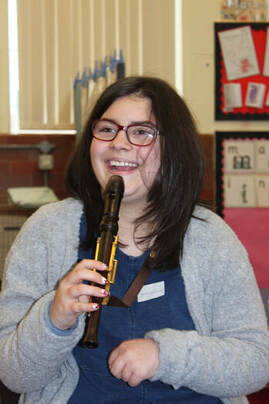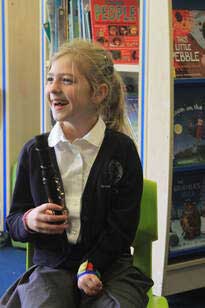 A one-handed recorder being tested at an OHMI event A one-handed recorder being tested at an OHMI event It’s now 25 years since the Disability Discrimination Act (DDA) was passed. The Act made it illegal for employers and service providers to discriminate against someone because they were disabled. There was, however, some criticism of its implementation. Whilst the legislation was passed in 1995, it was not until 1996 that employers and service providers were expected to make “reasonable adjustments”; and not until 2004 that the legislation applied to companies employing fewer than 15 people. The DDA may well have improved access in the workplace and across restaurants, libraries and arts and cultural venues, but what of other settings of significant educational and social value? Can we say that people with a physical impairment are able to enjoy the same level of access as those without, in all aspects of their lives? It is expected, both legally and morally, that disabled people are not denied the same access to concert halls and other music venues as their differently-abled counterparts. Yet when it comes to making music of their own, unlimited and undifferentiated participation remains an issue. This is perhaps unsurprising when virtually no musical instruments can be played without ten highly dextrous fingers. This creates limits to those with congenital disabilities and to amputees, as well as the millions who may have been injured, suffered a stroke, developed arthritis or for whatever reason lack the full strength and control of their upper limbs. Instruments require adaptation. Many have yet to be made available. For those that are, their purchase proves often to be financially prohibitive. As the country take stock of how 25 years of the DDA has had an impact on those living with a physical impairment, it’s timely that the OHMI Trust reflects on its own tenth anniversary and all it has achieved in opening up access to music-making: specifically in the core areas of research, innovation and teaching. The OHMI Trust was born in 2012 with just two trustees (Stephen Hetherington and Martin Dyke) no money, two volunteers (Stephen’s and Martin’s daughters), but with lots of ambition. Recognising that the lack of instruments is the first barrier to participation, OHMI launched its first competition, which was a collaboration with the Austrian arts and technology festival, Ars Electronica. The Competition challenge remains: to create musical instruments that can be played without the use of one hand and arm. Competition winning instruments take life in two ways: firstly, making music-making both accessible and affordable via OHMI’s Instrument Hire Scheme; and secondly, through OHMI’s Music-Makers teaching programme. Following its inception as a teaching pilot in Birmingham in 2015, Music-Makers was extended first to Hampshire and Surrey, and then to Nottingham and Northamptonshire. It was perhaps bringing together researchers, musicians, teachers, charities, funders, and government agencies from five continents at OHMI’s first conference on Music & Physical Disability: From Instrument to Performance in 2018, that accelerated OHMI’s ambitions in research. The following year, the OHMI Research Partnership was established with Queen Mary University, London and Birmingham City University. Its purpose is to form new research partnerships on music and disability with universities, researchers, musicians, educators, sociologists and instrument makers globally. Today, music-making for those living with an upper arm impairment is more accessible than ever. OHMI’s Instrument Hire Scheme collection exceeds 300 instruments and pieces of enabling apparatus. Its teaching programme has extended across the UK and its competition continues to support the design and manufacture of suitable instruments. It was certainly music to the ears of all those involved in OHMI that the UK Government shares OHMI’s belief in the importance of undifferentiated access to music-making. In describing the ‘New National Plan to Shape the Future of Music Education’ (published in February 2020), it pledged that, “Children from all backgrounds and every part of England should have the opportunity to learn a musical instrument; to make music with others; to learn to sing; and to have the opportunity to progress to the next level of excellence if they wish to”. The intent is certainly there. If the anniversary of the DDA tells us anything, however, it is that equality – whilst having gathered significant pace over recent years – has certainly not reached journey’s end.  It was over the dining-room table that my dad recently revealed, what was to me, a surprising statistic; only about 9% of disabled children attend special schools according to data collected by the Department of Education. If I were still a teenager, my first thought would’ve been: “Well, where are the other 91%? I’ve never met another disabled child at school.” But looking back, I think the answer is relatively simple; no one notices us. We get on with the difficulties of life uncomplainingly and, for the most part, pretty successfully, so we simply blend in with our able-bodied classmates. I suppose this is a compliment, albeit, in my experience, a somewhat condescending one. I can’t say how many times I’ve heard variations of the phrase: “Well done, for getting on with it,” and I thought, I guess rather uncharitably: “What else am supposed to do?” It’s not that I don’t appreciate the sentiment, but it just appears back-handed. I have no choice in the matter, so I have to find ways around the problems I face. When I can’t help but rely on other people for some things – changing my bedsheets, for example – the things I know I can do, like taking my shopping to my car, take on an extra significance, and so I’m determined to do them myself. (Having said that, if a hot guy offered to carry my shopping, I wouldn’t say no.) Anyway, I digress. The problem with just “getting on” with things is that teachers don’t always pick up on our difficulties. We should expect teachers to be informed about a child with special needs in their class but, this doesn’t always happen, as I discovered first-hand. When I entered secondary school, I found that not all of my teachers knew about my cerebral palsy. This was alright as long as we weren’t doing any two-handed activities, but as soon as we were…It was sometimes several weeks before a teacher became aware of my difficulties. Eventually, I just assumed that a new teacher wouldn’t know about my disability, so I ended up dreading lessons with teachers I didn’t know. Music is one of those subjects where it is particularly important to know of a child’s disability, but, weirdly, visiting instrumental teachers are not often told about such children in advance. Following Dad’s revelations, my journalist’s brain kicked in, and I decided to discover how those disabled children in mainstream schools were coping in music lessons. And so, I spoke to Professor Martin Fautley, Professor of Education at Birmingham City University. He told me that some schools cite GDPR restrictions as reasons for failing to inform instrumental teachers of any disabled children in their class. This obviously causes problems. Martin explained it to me: “If you’re going to turn up with a boot-full of the guitars, for example, and there’s a kid who only has the use of one arm, that might be quite good to know. Otherwise, there’s an embarrassing first lesson where the teacher thinks: “I had no idea you were in the class. I’m not quite sure what you can do.” But there’s another problem. Even if the teacher knows about the child; it’s not easy to find a solution. “First of all, you’ve got to know about it, then you’ve got to be able to do something about it, and then the thing which you wish to be able to do something about has to be available. So, for example, if [a teacher has] a child for whom OHMI would be a suitable organisation to approach, but they don’t know that OHMI exists, then they’re not going to be able to approach OHMI. It’s a vicious circle,” said Martin. And then there’s the cost: “Even if they do know OHMI exists and they want, say, a one-handed recorder, well, they are still a considerable amount of money. A specially-adapted plastic recorder could still cost over a hundred pounds. And they’re not available off the shelf.” As a result, so many disabled children in mainstream schools are left out, and sadly nobody’s quite sure what to do about it. But all you budding musicians shouldn’t despair yet: research, PR stuff and the badgering of important people are going on, so it might not be long before this “vicious circle” is broken. And maybe, it’s worthwhile to own your disability – people will sit up and listen (and perhaps a good-looking chap/girl will offer to carry your shopping!) |
CategoriesArchives
June 2024
|

 RSS Feed
RSS Feed
